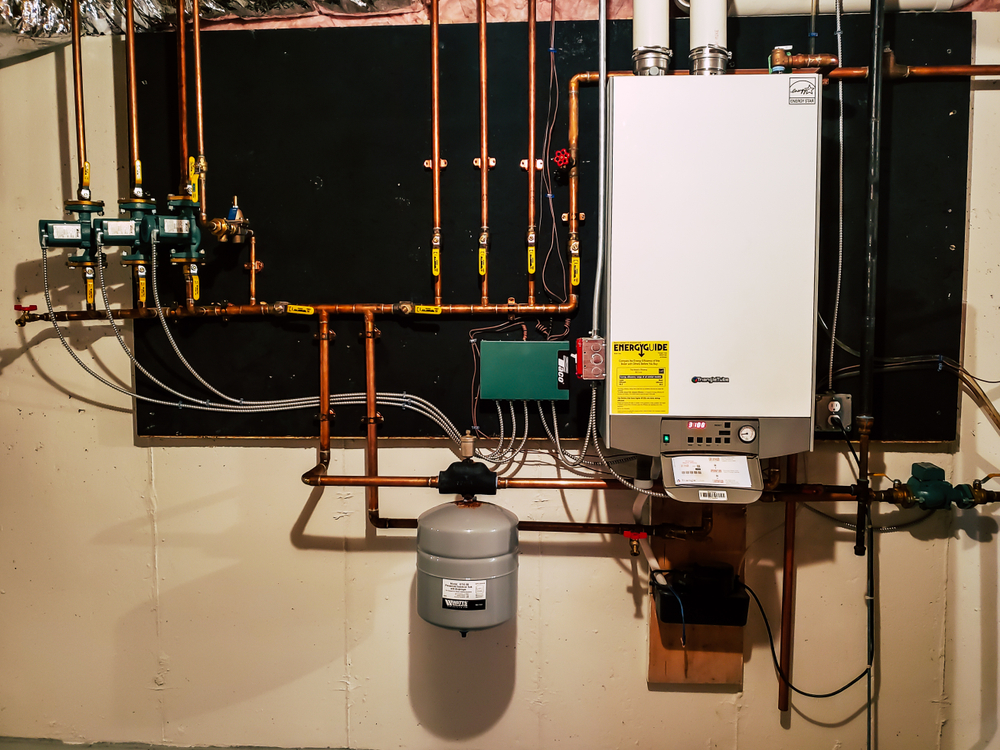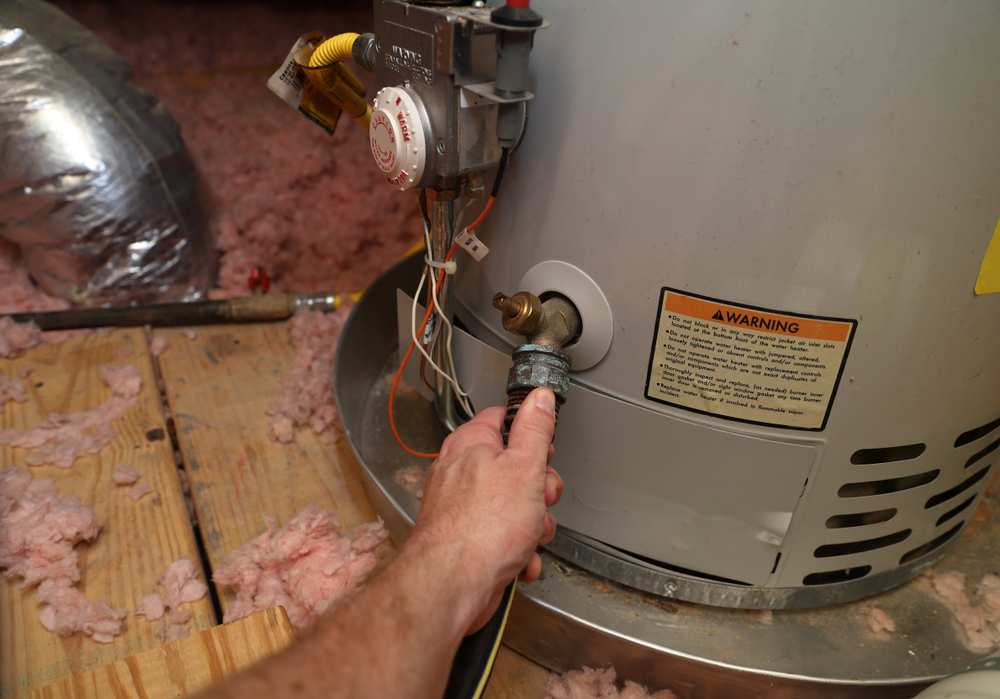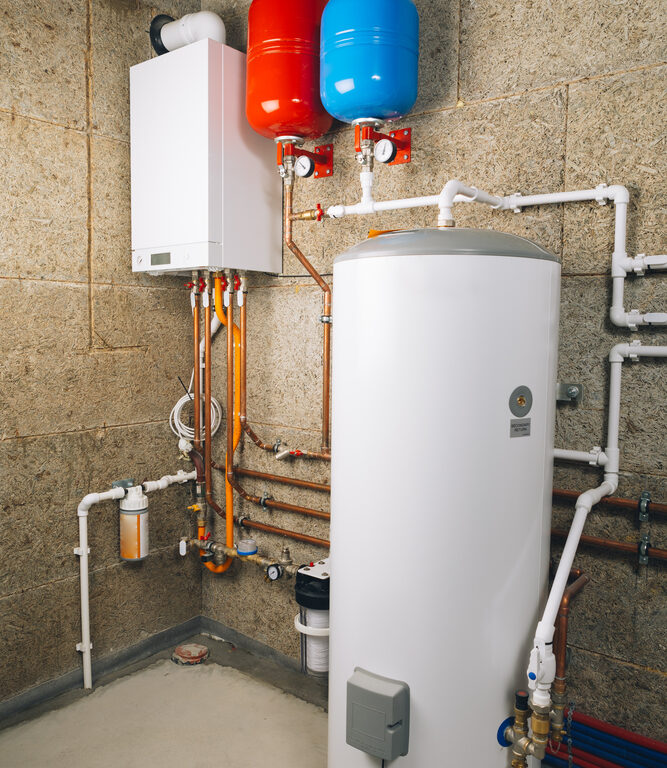Purchasing a new water heater is a significant decision. They’re expensive and will be part of your home for at least a decade, so you’ll want to go over your options carefully before choosing one.
In the past, a tank storage water heater was the only option. These units generally appear in the same room as a furnace and take up a lot of space. However, we now have tankless water heaters available, which heat the water on-demand, providing greater energy efficiency. But is a tankless heater always the best choice?
Here’s an in-depth look at the two types of water heaters, providing you with all of the knowledge needed to make an informed decision.
Let’s get things started by taking a look at the visual differences.
How They Look: Water Heaters vs. Tanks
Despite fulfilling a similar job, tank and tankless water heaters don’t even look like they’re in the same family.
You’ve undoubtedly seen a tank storage water heater, as they are large cylinders that hold a huge volume of water. In fact, many of these tanks are over 50 gallons in size. By comparison, the average person uses about 30 gallons of water to fill a bathtub.
Conversely, there’s a good chance you’ve never seen a tankless water heater because they’re small devices that mount on a home’s pipes in a crawl space or basement. They don’t take up a lot of space because they don’t require a tank to store the heated water.
Size is only one way they differ, as they function differently, too.
How These Heaters Work
A storage tank has a capacity of about 50 gallons, although some households have larger ones. These devices generally heat water using natural gas or electricity, but you can still find some fuel oil or propane tanks in operation.
These tanks continuously heat the water inside the tank using a burner, forcing homeowners to pay for the required energy whether they’re using the hot water or not.
On the other hand, tankless water heaters don’t have storage tanks. Instead, these units attach to a home’s hot water pipes and use a heat exchanger to bring the water to temperature. Electricity, natural gas, or propane can power this heat exchanger.
Since a tankless water heater only heats water when a hot water tap turns on, only the required amount of water is heated up.
Now that you know how these devices work, learning about the pros and cons of each is an excellent next step.

Pros of a Tankless Water Heater
Tankless water heaters are a relatively new technology. However, they are quickly increasing in popularity, particularly with homeowners who plan on staying in their properties for the foreseeable future.
Less Energy Use
One of the most significant benefits of a tankless water heater is the cost-saving on energy expenses. That’s because these units can use up to 50% less energy than a tank storage heater, depending on specific circumstances.
A household that uses 41 or fewer gallons of water per day could use 24-34% less energy, while homes that use about 86 gallons of water will see an 8-14% improvement in energy efficiency. Households that install a tankless water heater at each outlet will see savings of between 27% and 50%.
Overall, since a tankless water heater doesn’t have to warm a 50-gallon cylinder of water, it costs far less to operate.
Hot Water On-Demand
Another great benefit associated with a tankless water heater is its ability to deliver hot water on-demand. When running multiple fixtures at one time, such as a washing machine, dishwasher, and shower, a water tank will quickly empty.
However, a tankless water heater heats the water as you need it, so you never run out. Being confident that you’ll always have access to adequate hot water is perhaps one of most significant benefits for high- hot-water-usage households.
Longer Lifespan
A hot water tank has many components that can break down, leaving these units with an average lifespan of about ten to 12 years. However, tankless water heaters can last for 20 years or more and often have lengthy warranties to support this longevity.
The result is less worry for homeowners because they can be confident that their tankless heaters will last for a long time.
Reduced Risk of Flooding
Finally, there’s less flooding risk with a tankless water heater because there’s no tank that can leak. As only a small amount of water enters a tankless water heater at any given time, there will be less damage if the unit leaks. A leaky water tank could spill 50 gallons of water or more inside your home if a leak occurs when you aren’t there.
It’s worth noting that water tanks can leak when rust and corrosion form on the inside because of minerals in the standing water. As water doesn’t sit in a tankless water heater, there’s also less wear on the internal components.
Cons of a Tankless Water Heater
Despite all of the pros of tankless water heaters, these products have some downsides that you’ll have to consider.
Higher Upfront Costs
Perhaps the main reason for homeowners to avoid tankless water heaters is their upfront cost. In many cases, these units can cost double what you’d pay for a tank storage system, and this expense can be prohibitive for many families.
Installation is also more expensive because you’ll need a certified technician with experiencing installing tankless water heaters.
Might Have to Retrofit
There’s also no guarantee that your home will have space for a tankless heater. For example, if you don’t have a basement or crawlspace and all of your pipes run through the walls, you might need to renovate to figure out a place to put your tankless heater.
In many cases, homeowners in this situation install the tankless device in place of the tank, but this location might not always be the most convenient. The worst-case scenario is having to cut a hole in your wall and build a cupboard or closet around it to accommodate the tankless unit.

Pros of a Tank Water Heater
Tank storage water heaters are trusted devices found in millions of homes throughout the country. For that reason, they continue to be popular despite tankless products gaining popularity in the marketplace.
Easy Installation
A significant benefit of a water storage heater is its easy installation. An experienced technician can have a new water heater tank installed in a matter of hours, so homeowners don’t have to struggle without hot water for days on end.
Since the necessary infrastructure is likely already in place, installing a tank water heater is often as simple as removing the old unit and putting a new one in its place. A tankless heater can be a quick installation, but it all comes down to the house’s set-up.
Tested Technology
Tank storage water heaters are a tested technology that homeowners find comfortable. There’s always some resistance when a new product comes onto the market, particularly when it involves a utility that can cause a lot of damage if it falters.
Storage heaters have decades of data proving that they’re safe and functional, providing peace of mind when installing one in your home.
Becoming More Efficient
Finally, tank water heaters are becoming more efficient, saving you money on your annual water heating bills. Energy Star certified water heaters use about 10% less energy than models without that certification, helping homeowners spend less on hot water.
These Energy Star units aren’t as efficient as tankless water heaters, but they significantly improve on the heaters of a decade ago.
Cons of a Tank Water Heater
Tank storage water heaters have existed for decades, but they are far from a perfect set-up. These units have some drawbacks worth considering before making a purchase.
Wasted Energy
Standby energy is a significant problem with tank storage water heaters because you’re heating the entire tank of water, whether you need it or not. The system also keeps the water hot indefinitely, which uses even more energy.
Shorter Lifespan
The lifespan of storage tank heaters is an issue because they usually only last for about ten years. You can sometimes get a few more years from your unit, but once it approaches ten years of age, it’s time to start thinking about its replacement.
This shortcoming is significant when you compare it to the 20+ years you can get from a tankless heater.
Slower Performance
Tank storage water heaters are also slower to provide hot water than their tankless counterparts. Once again, the reason is that these systems must heat the entire 50-gallon tank before a consistent stream of hot water becomes available.
If you use a lot of hot water in your home, this slower performance could become an issue.
Things Are Heating Up
When deciding between these two types of water heaters, you’ll have to consider your priorities. If you want to save money on your monthly energy bills while reducing your carbon footprint, a tankless heater could be the way to go.
Likewise, if saving on the upfront cost and using a time-tested technology is vital to you, a tank water heater is your best bet. Carefully consider your options to make the best decision for your home.
